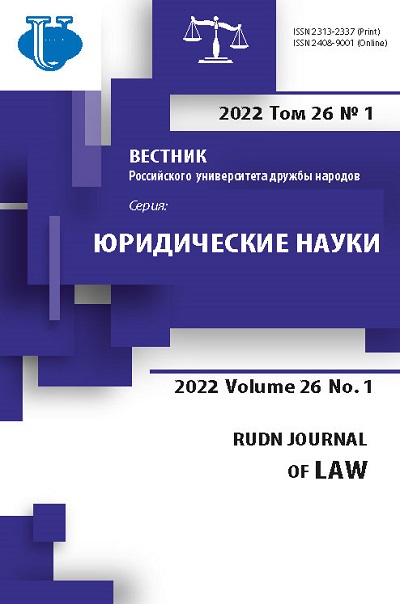Реализация конституционных положений о единой публичной власти в Российской Федерации
- Авторы: Чихладзе Л.Т.1, Фризен О.А.2
-
Учреждения:
- Российский университет дружбы народов
- Московский государственный областной университет
- Выпуск: Том 26, № 1 (2022)
- Страницы: 7-24
- Раздел: ГОСУДАРСТВО И ПРАВО В СОВРЕМЕННОМ МИРЕ
- URL: https://journals.rudn.ru/law/article/view/30566
- DOI: https://doi.org/10.22363/2313-2337-2022-26-1-7-24
- ID: 30566
Цитировать
Аннотация
Рассматриваются изменения, внесенные в действующее законодательство Российской Федерации после внесения изменений в текст российской Конституции в 2020 г. Их анализ производится с учетом ранее высказанных Конституционным Судом РФ позиций по отдельным вопросам организации и осуществления публичной власти в Российской Федерации. Авторами обозначены возникающие в этой сфере вопросы, и особенно подробно рассмотрены возможные проблемы организации и реализации публично-властных полномочий в федеральных территориях на основе анализа Федерального закона «О федеральной территории «Сириус» от 22.12.2020 № 437-ФЗ, а также законопроект «Об общих принципах организации публичной власти в субъектах Российской Федерации».
Об авторах
Леван Теймуразович Чихладзе
Российский университет дружбы народов
Email: chikhladze_lt@rudn.university
ORCID iD: 0000-0002-8807-2572
доктор юридических наук, профессор, заведующий кафедрой муниципального права, Юридический институт
117198, Российская Федерация, г. Москва, ул. Миклухо-Маклая, д. 6Ольга Анатольевна Фризен
Московский государственный областной университет
Автор, ответственный за переписку.
Email: ofa73@mail.ru
ORCID iD: 0000-0003-2528-5690
кандидат юридических наук, доцент кафедры конституционного и муниципального права, Институт экономики, управления и права
105005, Российская Федерация, г. Москва, ул. Радио, д. 10АСписок литературы
- Алебастрова И. Конституционные права и свободы в третьей постсоветской республике в России // Сравнительное конституционное обозрение. 2021. № 2 (141). С. 46-49. https://doi.org/10.21128/1812-7126-2021-2-46-58
- Бондарь Н.С. Местное самоуправление и конституционное правосудие: конституционализация муниципальной демократии в России. М.: Норма, 2008. 278 с.
- Гриценко Е. Федерализм и местное самоуправление в свете российской конституционной реформы 2020 года // Сравнительное конституционное обозрение. 2020. № 4 (137). С. 80-97. https://doi.org/10.21128/1812-7126-2020-4-80-97
- Ирхин И.В. Федеральные территории и федеральные округа: смешение конституционно-правовых моделей // Журнал зарубежного законодательства и сравнительного правоведения. 2017. № 6. С. 30-36. https://doi.org/10.12737/article_5a1e71d9d03671.35583995
- Краснов М. Проблема концепта «гарант конституции». Сравнительное конституционное обозрение. 2021. № 2 (141). С. 15-34. https://doi.org/10.21128/1812-7126-2021-2-15-45
- Конджакулян А.М., Величкина М.В. Конституционное расширение полномочий Президента Российской Федерации. Проблемные аспекты // Закон и право. 2019. № 1. С. 163-165. https://doi.org/10.24411/2073-3313-2019-10037
- Ларичев А., Маркварт Э. Локальные сообщества как инструмент развития общемуниципальной демократии: опыт Германии и уроки для России // Сравнительное конституционное обозрение. 2020. № 5 (138). С. 74-87. https://doi.org/10.24147/2542-1514.2019.3(1).100-107
- Ларичев А., Чихладзе Л. Местное самоуправление в России на распутье: динамика конституционной доктрины и правового регулирования // Вестник Санкт-Петербургского университета. Серия 14. Право. 2020. Т. 11. № 2. C. 273-292. https://doi.org/10.21638/spbu14.2020.202
- Ливеровский А.А., Овчинников А.И., Авакьян С.А. Конституция. Конституционализм. Конституционный Суд: монография. М.: Проспект, 2021. 152 с.
- Медушевский А. Переход России к конституционной диктатуре: размышления о значении реформы 2020 года // Сравнительное конституционное обозрение. 2020. № 3 (136). С. 33-49. https://doi.org/10.21128/1812-7126-2020-3-33-50
- Моляренко О.А. Местное самоуправление в современной России, или Хроники крайней власти // Мир России: Социология, этнология. 2021. Т. 30. № 1. С. 8-28. https://doi.org/10.17323/1811-038X-2021-30-1-8-28
- Праскова С. О федеральных территориальных единицах // Актуальные проблемы российского права. 2013. № 12. С. 1543-1551.
- Соболева А. Социальные права в контексте новых полномочий Президента //Сравнительное конституционное обозрение. 2020. № 3 (136). С. 82-96. https://doi.org/10.21128/1812-7126-2020-3-82-96
- Троицкая А. Селективная рациональность? Аргументация Конституционного Суда РФ о сроках полномочий Президента в зеркале когнитивности // Сравнительное конституционное обозрение. 2021. № 2 (141). С. 84-98. https://doi.org/10.21128/1812-7126-2021-1-84-99
Дополнительные файлы















